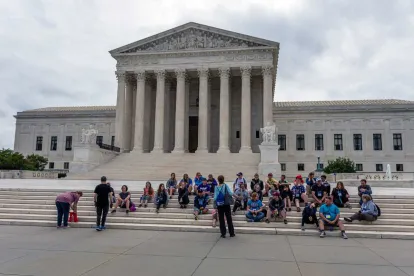After years of litigation, the United States Supreme Court, in Bittner v. United States, 598 U.S. ____ (2023), determined that the penalty for a non-willful failure to file a Report of Foreign Bank and Financial Accounts (“FBAR”) applied per FBAR form rather than per foreign financial account. The decision settled a circuit split that developed between the Ninth and Fifth Circuits in a clear win for taxpayers but left open the door for the IRS to continue to seek high penalties for violations of FBAR filing requirements.
The FBAR filing requirement applies to all United States persons with direct and certain indirect interests in or signature authority over a foreign financial account where the aggregate value of such accounts in any year exceeds $10,000. Specifically, Section 5321(a)(5) of the Bank Secrecy Act (“BSA”) authorizes the Treasury to impose a civil penalty for any non-will failure to file FBARs “not to exceed $10,000.” 31 U.S.C. § 5321(a)(5)(B).
The issue in Bittner was whether such $10,000 penalty should be applied per FBAR form or per foreign financial account. The taxpayer, Alexandru Bittner, was a dual U.S. and Romanian citizen, who failed to file FBARs from 2007 through 2011 to report his 272 foreign financial accounts. When Mr. Bittner discovered his mistake, he hired an accountant to file his FBARs for those years. The issue arose when the IRS imposed a non-willful penalty of $2.72 million, or $10,000 for each account not timely reported. The manner in which the IRS imposed the non-willful penalty against Bittner was in conflict with the Ninth Circuit’s ruling in Boyd, which held that the non-willful penalty should be applied per FBAR and not per undisclosed foreign account. See Bittner v. United States, 19 F.4th 734 (5th Cir. 2021); United States v. Boyd, 991 F.3d 1077 (9th Cir. 2021).
In determining that the non-willful FBAR penalty applied on a per form basis, the Supreme Court considered that the BSA states that taxpayers have a legal duty to file reports with information about foreign transactions and relationships and so the violation occurred when the individual failed to file a report consistent with the statute. The Court reversed and remanded the decision for further proceedings consistent with the opinion, which will likely reduce Bittner’s penalty to no more than $50,000. In addition, the Court’s decision will apply in all pending and future cases of non-willful penalties. However, there remains an open question – whether taxpayers previously assessed per account penalties will be successful in seeking refunds. In the landmark case, United States v. Windsor, 570 U.S. 744 (2013), where the Court held the statute underlying the assessed tax unconstitutional, taxpayers in the same position as the respondent taxpayer were allowed, pursuant to a revenue ruling, to amend their tax return so long as the statute of limitations had not run on the year(s) at issue. Therefore, affected taxpayers should contact experienced legal counsel about their particular circumstances, since they may likely receive refunds of non-willful FBAR penalties which were imposed under the per account penalty regime.
While the Bittner decision is a win for taxpayers, the government in Bittner argued that the Court’s interpretation could cause the Treasury to require a separate report for each account. If action was taken by the Treasury to change the FBAR reporting requirements, the IRS would be able to, in effect, accomplish a per account violation penalty regardless of the Court’s decision. The majority SCOTUS opinion acknowledged the argument but declined to address it as outside of the scope of the matter. However, whether this could be subject to a separate challenge under the Administrative Procedures Act based on the legislative interpretation discussed in Bittner, is to be seen. Alternatively, the IRS could shift to assessing more willful penalties, which are subject to much higher penalties of up to $100,000 or 50% of the account balance per year, whichever is greater. It is important to note that several courts have affirmed broad definitions of the willfulness standard. Specifically, courts have already held that a taxpayer can commit a willful violation without actual knowledge of the obligation to file an FBAR. Notably, in Kimble v. United States, the Federal Circuit, affirming the holding of the Court of Federal Claims, held that Kimble’s failure to review her tax returns, which would have revealed the FBAR requirement, was sufficient to show willfulness in violation of FBAR requirements. 991 F.3d 1238 (Fed. Cir. 2021). In another case, Bedrosian v. United States, where the taxpayer has petitioned SCOTUS for review, the Third Circuit expanded the willfulness standard leading the lower court to assess the maximum penalty where the taxpayer “ought to have known” or easily could have found out about the FBAR requirement, on remand. 42 F.4th 174 (3d Cir. 2022). SCOTUS is due to decide whether it will review the Circuit Court’s decision by April 2023.
In addition, the Bittner decision may make a submission to some voluntary disclosure programs less desirable. The Streamlined Domestic Offshore Procedure (SDOP) is an IRS disclosure program for U.S. taxpayers who reside in the United States. In exchange for a taxpayer disclosing past non-compliance, the program limits the non-willful penalty to 5% of the highest aggregate balance of the taxpayer’s foreign financial assets that would otherwise be subject to the FBAR penalty. Now, depending on the taxpayer’s foreign account balances, it may be less expensive to pay the one per report penalty of $10,000 per year versus the 5% Domestic Streamline Penalty. However, it is important to note that the IRS still recommends taxpayers use voluntary disclosure programs to come into compliance with past failures.
Overall, taxpayers should take care to understand their information reporting filing requirements. Filing an FBAR does not increase a taxpayer’s payment obligation and the increasing penalties in this area have heightened the risks of an inadvertent error leading to significant financial losses. Prosecution of these violations is unlikely to slow down following continued action by the United States government against foreign banks and the expanded whistleblower statutes. The next FBAR filing deadline is April 17, 2023, with some extensions applying to certain taxpayers. Any United States taxpayer with questions about their filing obligations should contact a licensed tax attorney for legal advice specific to their situation. Polsinelli’s tax group has extensive experience with FBAR reporting obligations, FBAR litigation in the district courts, and the various voluntary disclosure programs offered by the IRS and is prepared to assist with compliance in this area.






 />i
/>i

